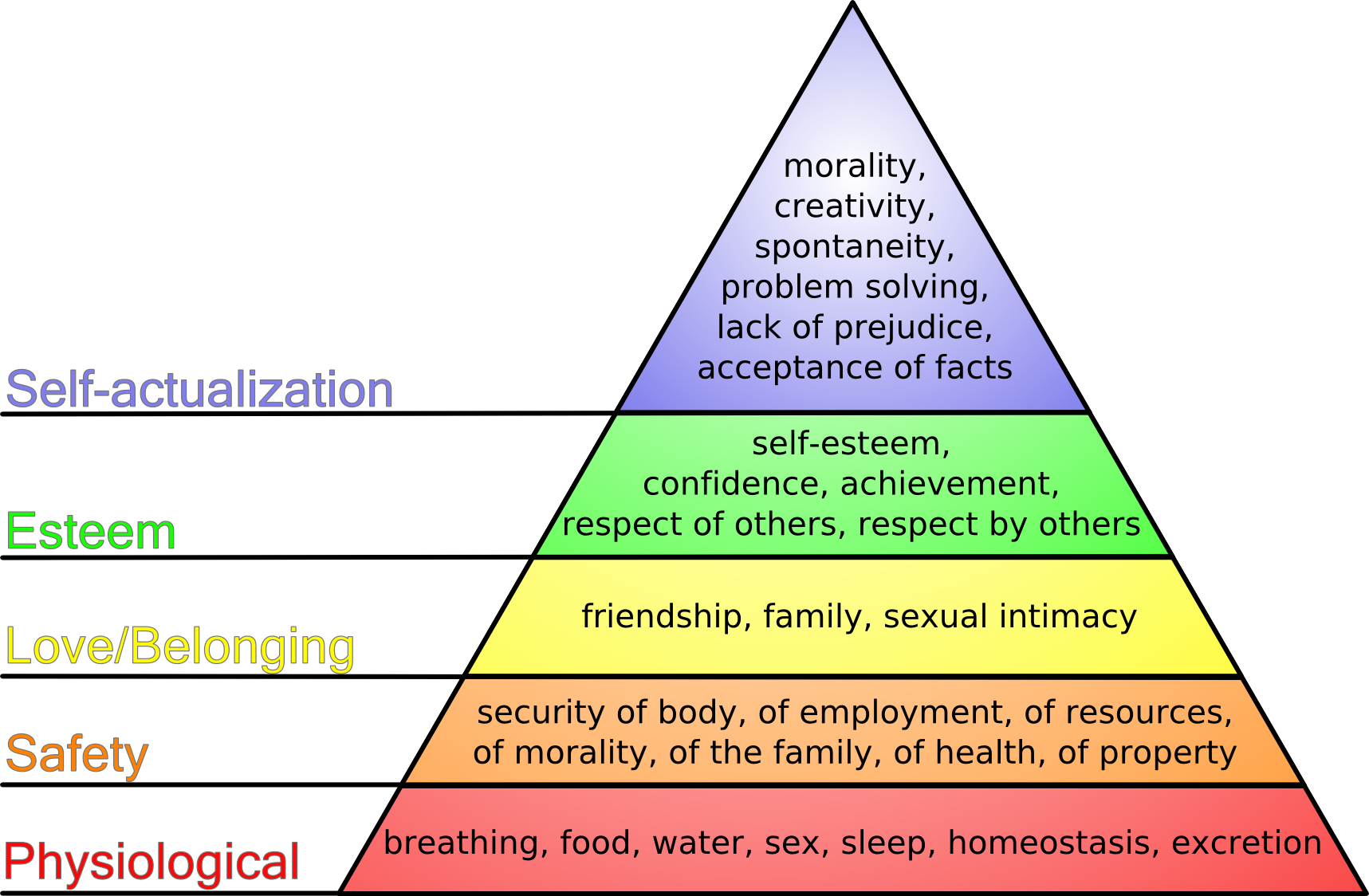First Things First: You have to Lead Yourself
Often it is because of our functional expertise that we are promoted to higher levels of responsibility. We take pride in the validation and recognition for our competence in our previous producer role. We are used to making and doing, leading wasn't necessarily in the equation because our success or failure was typically determined by our own actions. The term "supervisor" seems like a title given for the increased administrative duties we have thrust upon us. You may feel during those first few days that you are Ricky Bobby and don't know what to do with your hands.

So, what do you do with your hands? Lead yourself first!
Leading Yourself
It seems an odd statement to lead oneself, but it is the fundamental first step to leading others. Why should anyone follow you, if you can't lead yourself? It is a similar concept to putting your own oxygen mask on first before you help those around you.
Many blog posts and leadership gurus and training companies describe the concept in many ways. Some of the associated concepts are Human-Centered Leadership, or servant-leadership. These share similar conceptions, like blind men describing an elephant, but leading yourself is upstream of these leadership theories. Leading yourself boils down to a few factors: regulating your emotions, or self-awareness and introspection, and setting the example.

Regulating Emotions
Regulating your emotions does not mean you don't have them. It means you control how you react and create tripwires for yourself so you don't make situations worse and lose the trust of your subordinates.
In my home, we have a sign that says, "Don't Make It Worse". There are numerous times where my kids are fighting, and I point to the sign to help them realize their emotional regulation is lacking. When we are hungry, tired, sad, or feel any type of dis (disheartened, disrespected, disowned, etc.) we tend to fight for our needs instead of communicating in a positive way to obtain them. Instead of communicating positively, we lash out, attempt to force our way, or use other unhealthy tactics to get our needs met.
Another way to remember when you should be on guard for times when you may not be your best self is to remember HALT. HALT stands for:
- Hungry
- Angry
- Lonely
- Tired
What should you do when you identify these moments? HALT—STOP--Don't make it worse! Find a place for you to think. In the book Lead Yourself First, (which has a slightly different focus than this post) authors Raymond Kethledge and Michael Erwin highlight the importance of seeking solitude to provide the emotional balance and clarity you need to lead well.
What do you do with this knowledge?
Create a script for yourself that acknowledges you may not be the best version of yourself, and you want to give them your best, so you need to take some time to address the underlying issue that is flashing warning signs at you. I have damaged more than my fair share of relationships because I let my emotions control my actions instead of taking action to control my emotions.
But don't people respect those who show their emotions? Shouldn't we share our feelings to be more authentic? This is a fine line with a great deal of nuance. However, the Hippocratic oath should be at the forefront here: Do no harm! If you are justifying bad and destructive behavior as authentic, then you really have no business being a leader. You aren't ready.
Your mission is to lift others up so that they can be better versions of themselves.
If you are hurting others and justifying it with calling it "authentic behavior" or "being assertive" or "it's just the way I am," then you really aren't holding yourself accountable and you're not being the best version of yourself.
Lead yourself to the best version of you, so that you can help others be the best version of themselves. If you find yourself consistently angry or reacting uncontrollably, you should reflect on why you are not able to control your emotions. You may need help from a professional to tap into personal introspection.

Self-Awareness and Introspection
Have you ever worked with someone who lacked self-awareness? Maybe you have worked with a coworker who couldn't read a room or had a boss who lacked empathy when you explained a loved one passed away or your children were sick. Perhaps even worse, they hurt others and don't care. These behaviors leave others feeling misunderstood or worse, unvalued. When people are put in positions of authority and power this is not the same as being a leader.
This section is organized by questions for you to ask yourself. Embrace the opportunity to be introspective and ask yourself, "What does it mean to be a leader?"
Is Your Thinking About Leadership Inverted?
Authority and power come from your bosses in positions of authority and power above you who transfer their responsibility to you. The title of "leader", however, comes from below; it is a title only bestowed by those who follow and has little to do with your position or power and more to do with your ability to engender trust in others.
If you have any chance of earning the title of leader, then you must realize it is primarily a social endeavor. While the company may be in a particular field of business; you are in the people business with a long-term focus on creating value for the business via your team.
What Do Your Followers Want From You?
Make no mistake, we know what your superiors want from you. They want you to get the mission done. They want you to deliver the results, which is the reason they put you in the position in the first place. But what does your team want from you?
Let's not make this complicated. There are multiple lenses from which we can answer this question. However, the Slalom Foundation suggests it is
- Safety & Security,
- Belonging, and
- Value
This framework isn't shocking, we can derive the same ideas from Maslow's hierarchy of needs when he identifies
- Physiological needs
- Safety needs
- Love and Belonging
- Esteem
- Self-Actualization

One of the key principles of this is that we can't move up the needs ladder with deficiencies in the foundational needs. If we want our followers to exercise creativity, initiative, problem solving then we can't fully obtain them if we create an environment of fear, ridicule, cliques, or shame. Having been a part of an all-star team of some of the best our country has to offer, I can attest that we never achieved our potential, far from it, because of a culture of fear, ridicule, and shame.
Now that you have reflected on what leadership means to you and what you think your followers want form you, we have our most important question.
Who do you follow and why?
Take some time and evaluate who some of your leadership heroes are. Do you have anyone that you have met where you thought to yourself, "I will go to the Gates of Hell dressed in a speedo and armed with a spork for this person?" I know I have that list. Now, why are they on that list? What attributes do they possess or demonstrate that make you want to follow them?
I imagine some of those attributes will be loyalty, a degree or disposition toward excellence, honesty, and an expression of genuine care. That list is worthy of a whole separate post, but the point is that you have a list of attributes in a person that resonates with you. You trust them. And because of that trust you will do things for them that you won't do for others. That is how relationships work.
So, what we find is that leadership is less about position and more about the person. It is about the type of person you are and how you make others feel.
Leadership is about the person, not the position.
Set the Example
Now that you have thought about who you follow and why, what they want from you, and the need for regulating your emotions, we need to put that all together and set the example. Quite simply, be the list you made above. We have talked about the practical aspects of monitoring yourself, understanding your triggers, and evaluating what attributes you value most, so the last step is practicing it.
However, it is not simply putting together a recipe. There are components of doing what you don't want to do in the short term to gain in the long term. Some would call this "adulting" like doing the dishes after dinner instead of leaving them for the morning, or going on an early morning run instead of sleeping in. The point is that being a leader is not about getting the nice parking and doing what you want. It is actually about denying yourself a bit of autonomy and at times immediate pleasure for the benefit of others.
In short, set the example for others to follow and the behaviors you want them to demonstrate.
One of the most impactful moments of my life was when I attended a pretty long and intense military course. There was a group of eight of us and like most things in the military you should have a person who is your wingman and sticks with you. As we received the initial welcome brief and expectations of the devotion and commitment the course would require from us, the cadre left stating that the sooner we came together as a team, the better the course would be for all of us.
The oldest member of the course stood up and said that we should go to a "cultural dancing establishment" or a strip club. I said I would go where-ever they wanted but that I would not go there. My newfound wingman said, "I'm with him, I'm not going there." The class then demurred, and everyone left without us spending the evening together.
I then turned to thank my newfound friend and the next thing he said to me has been seared into my memory. My friend played college football as a fullback, and he shoved his meaty finger into my chest and said to me, "You better be who you say you are." I think about what he said all the time. Am I who I say I am? Am I the leader that I say I am? Do I regulate my emotions the way I expect and tell other to? Do I have the integrity I expect others to have? Do I cut corners? Am I being honest? I'll never forget what he said to me because it comes down to am I setting the example and being the man and leader that I say I am?
After all, as the question highlights, leading yourself first is the hardest part of leadership, but it is foundational to leading others.
Summary
- The most important part of leadership is getting the foundation right by leading yourself first.
- Leading yourself involves regulating your emotions, being introspective for what you think leadership is and what you value in those you follow, and setting the example for others.
- Who do you follow and why? Make a list, then be the list.
- Then ask yourself, "Are you who you say you are?"
Lead well!


Member discussion